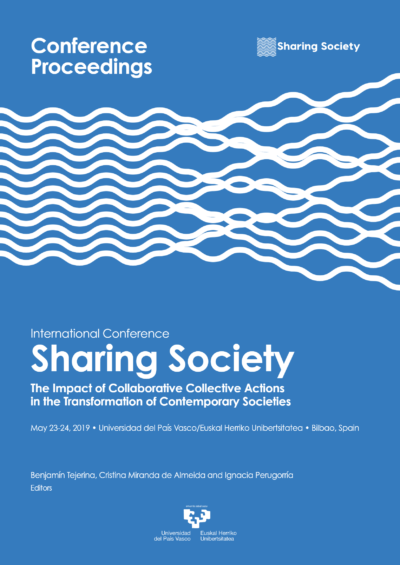
Sharing Society. The Impact of Collaborative Collective Actions in the Transformation of Contemporary Societies (Conference Proceedings)
Benjamín Tejerina e Ignacia Perugorría Libro. Actas de Congreso 2019 CEIC, Grupo Consolidado
Leioa: Universidad del País Vasco/Euskal Herriko Unibertsitatea
For decades, the concept of collective action has been widely used in the social sciences, giving birth to the prolific areas of protest, contentious politics and social movements studies. A myriad of theoretical approaches and empirical studies have subsequently sprung up within these confines, reaching almost every single corner of our academic world, and intertwining with the practice of movements themselves. But however fertile this area has been, little research has so far delved into a crucial aspect of collective action: its collaborative dimension.
In recent years, an emerging field of study focusing on the sharing or collaborative economy has begun to shed some long-overdue light on this aspect. Colleagues from various disciplines such as economics, anthropology, and philosophy, among others, have started to point to a blooming economic model often defined as the peer-to-peer (P2P)-based activity of acquiring, providing or sharing access to goods and services, mostly through online platforms. Under this term, case studies have analized experiences as diverse as ride or car sharing (e.g. Uber and Car2Go), apartment or house renting and couchsurfing (e.g. AirBnB), crowdfunding (e.g. Kickstarter and Indiegogo), reselling and trading (e.g. Ebay or Craigslist), and knowledge and talent-sharing (e.g. TaskRabbit and LivePerson). We would nonetheless argue that some of these cases lack key collaborative traits in both their setup and praxis. So much so that some scholars have called for the use of the term true sharing economy to distinguish the former from more nuanced and complex experiences.
The concept of sharing society, guiding both our research and this international conference, is inspired by the conceptualization of collaborative collective action, defined as a “the group of practices and formal and informal interactions that take place among individuals, collectives or associations that share a sense of belonging or common interests, that collaborate and are in conflict with others, and that have the intent of producing or precluding social change through the mobilization of certain social sectors” (Tejerina 2016).
Under the motto “Sharing Society. The Impact of Collaborative Collective Actions in the Transformation of Contemporary Societies,” the international conference will take place during the late days of May 2019 in the city of Bilbao. The conference stems from the research project “Sharing Society. The Impact of Collaborative Collective Action. Analysis of the Effects of Practices, Bonds, Structures and Mobilizations in the Transformation of Contemporary Societies,” directed by Prof. Benjamín Tejerina, funded by the Spanish Ministry of Economy and Competitiveness (MINECO CSO2016-78107-R), and hosted by the Collective Identity Research Center (CEIC), at the Department of Sociology 2, Universidad del País Vasco/Euskal Herriko Unibertsitatea.
Our conference sets out to analyze the characteristics, trajectory and impact of collaborative collective actions in a context of erosion of the welfare state. It also seeks to present and discuss the most recent innovations, trends, and concerns, as well as practical challenges encountered, and solutions adopted in the fields of collaborative collective actions. The conference will address the following questions: How, when and where does collaborative collective action occur? Which are the characteristics of contemporary collaborative collective action? What are the practical, symbolic, and legal effects of collaborative collective actions for the forging and recovery of social bonds? And, finally, what forms of interaction emerge from these types of actions?
This Book of Proceedings, published in the weeks prior to the international conference, compiles all conference papers submitted in due time and format. It features both theoretical and empirical proposals exploring collaborative collective actions in the areas of work, production, consumption, culture, arts, science, housing, care, knowledge and education, solidarity with precarious groups, and politics and civic participation. Authors come from diverse fields of study, such as the social sciences, humanities, architecture, urban planning, and design. A public roundtable organized as a pre-conference event will feature speakers working with citizen participation in the sciences, arts, media and politics (e.g. in cultural institutions, cultural policy, social media platforms, cooperatives, and NGOs). All texts were subjected to a doubleblind peer review process and, in a few cases, to a third reviewer. The volume includes 57 conference papers in both English (the conference’s official language) and Spanish.
